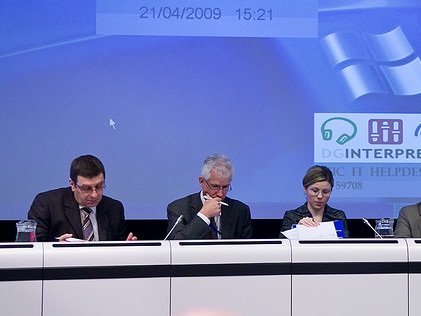ACTA won't make ISPs cops: EC

The European Commission (EC) has told UK telco giant BT that the Anti-Counterfeiting Trade Agreement (ACTA) will not force internet service providers (ISPs) to police their networks for copyright infringement.

(ACTA — stakeholders' consultation meeting image by Temmu Mantynen, CC BY-SA 2.0)
The agreement aims to introduce tightened uniform copyright laws and enforcement capabilities across America, Europe, the UK and Australia. But the clandestine process has been criticised by some for its lack of transparency and public input.
It seems less likely that ISPs would be liable for acts of copyright infringement by their customers after a controversial three strikes rule, which would require ISPs to disconnect subscribers who repeatedly infringe copyright law, appeared to be dropped.
BT group public and government affairs president Larry Stone said the EC had "reassured" the telco that ACTA will not require ISPs to monitor their networks for copyright infringement, but said the agreement must be "crystal clear" on the issue.
"[ACTA] must not in any way imply that liability via infringement is possible by telecoms or broadband or internet service providers in performing their roles insofar as their hosting or 'mere conduit' roles are concerned," Stone said in an email to ZDNet Australia.
"BT does not believe this is intended — indeed, the EC has reassured us on this point — but the treaty must be crystal clear on this."
Stone said the telco will be potentially affected by the treaty through its telco operations, and research and development and intellectual property rights portfolio.
"ACTA is potentially an important step forward for [its portfolio and R&D] in establishing better enforcement standards for existing rights," Stone said.
Competition is king
Open access will tighten competition, and create equitable broadband for Australia as it does for the UK, Sweden and New Zealand, according to Stone.
He said the price and technology structure for the National Broadband Network (NBN) must be transparent and non-discriminate for it to succeed, and pointed to UK reforms that have created what Stone sees as the world's most competitive telco market.
"There are over 200 broadband service providers. The UK has amongst the lowest broadband prices and highest penetration of [Organisation for Economic Co-operation and Development] nations."
Stone said the success of the NBN will be determined in part by regulation that promotes "fair and innovative competition at the wholesale and retail levels" and "the opportunity, not the right" for infrastructure investors to secure a return on capital commensurate with risk.
The BT Openreach arm was created in 2006 following a deal with the government communications regulator as a means to functionally separate BT's local access and backhaul divisions to provide equitable access to telecommunications providers. Japan, Italy and New Zealand have also eyed functional separation to drive industry reform.
In July, BT Openreach inked a £525 million deal with Israel-based ECI Telecom to create a fibre-optic network to serve some 18 million UK households.